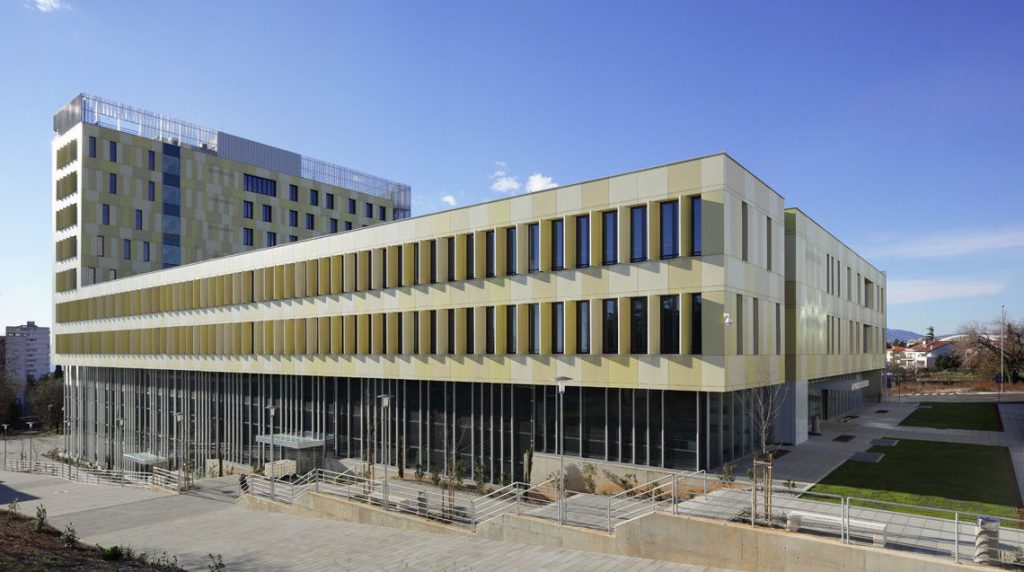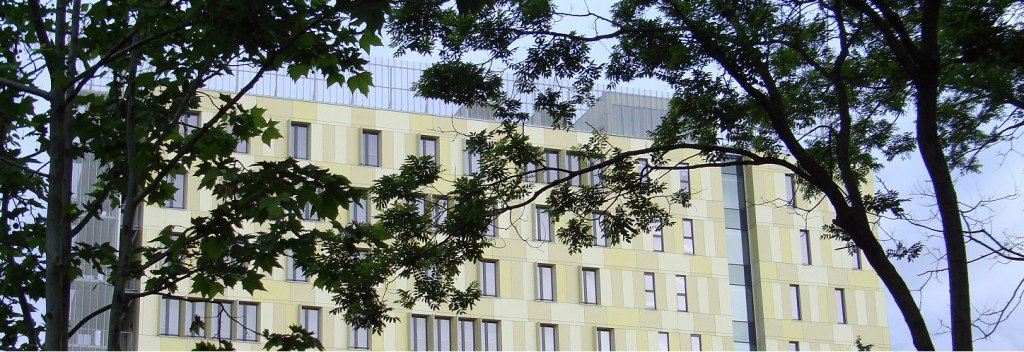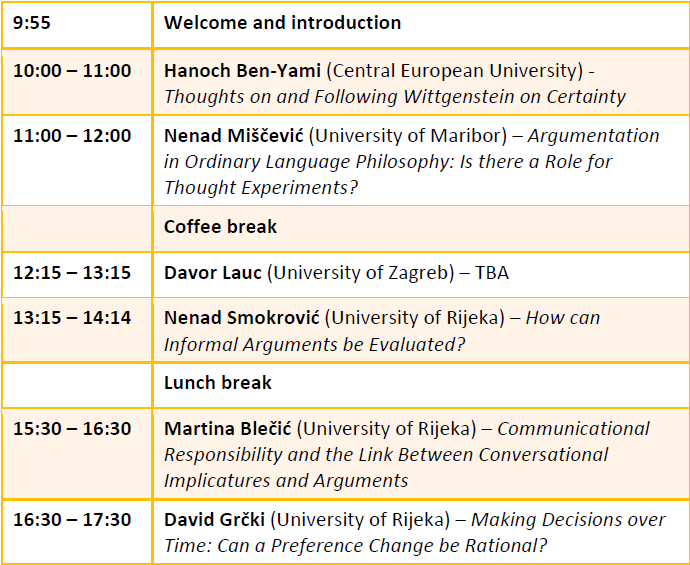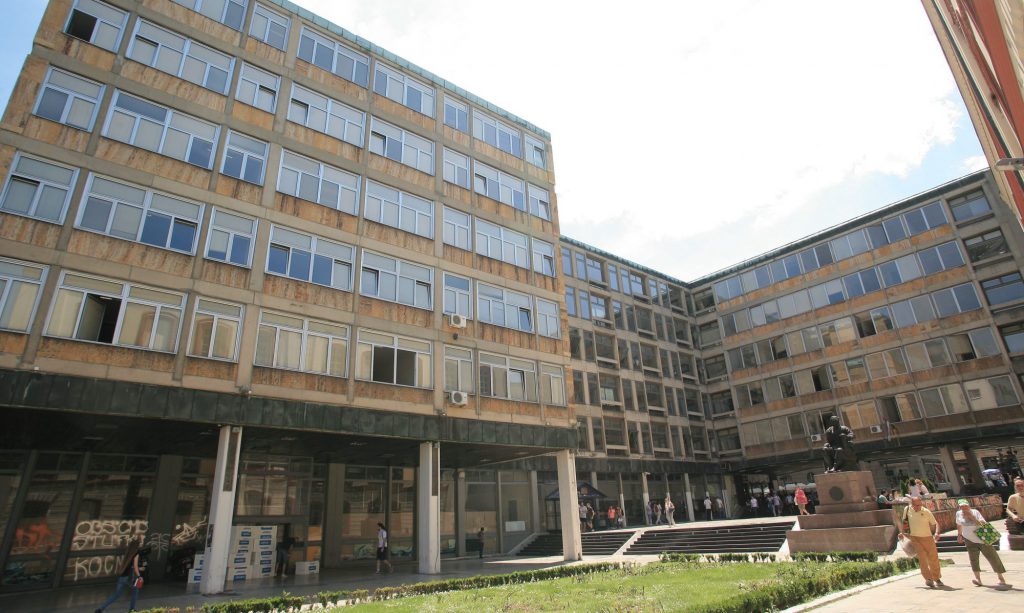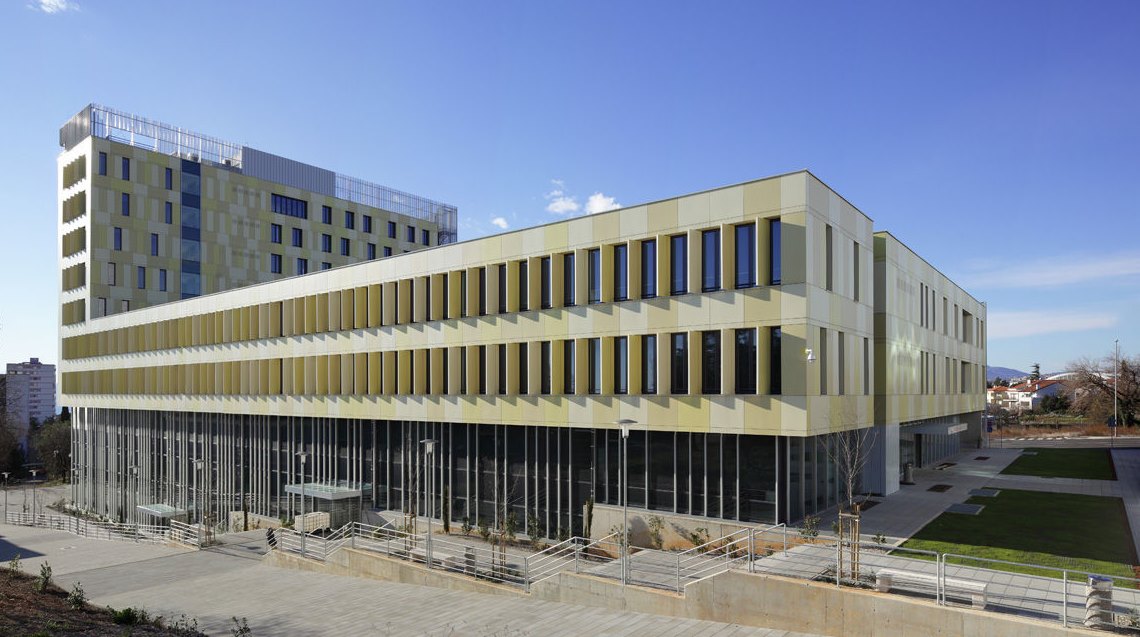Home » News
Category Archives: News
Program nastave – 2018./2019.
Program nastave:
II. (ljetni) SEMESTAR, 2018-2019.
OBAVEZNI KOLEGIJI:
Prof. dr. sc. Snježana Prijić Samaržija: Teorije znanja, (Prvo predavanje
6.03.2019. u 16 sati);
Prof. dr. sc. Elvio Baccarini: Moralne teorije, (Lipanj 2019).
IZBORNI KOLEGIJI:
Prof. dr. sc Luca Malatesti; doc, dr. Marko Jurjako, Filozofija psihologije
(Druga polovica svibnja 2019.)
Prof. dr. Predrag Šustar, Filozofija znanosti; darvinizam,
molekularna biologija i medicina (teorije objašnjenja),
(Travanj 2019.)
Prof. dr. sc. Petar Bojanić, Socijalna ontologija, (Početak nastave: 8. April
2019.)
Prof. dr. sc. Aleksandra Golubović, Filozofija egzistencije, (Početak
travnja 2019.)
The doctoral workshop – Metaphysics, Sophistry and Illusion
The doctoral workshop ”Metaphysics, Sophistry and Illusion” led by professor Mark Balager will be held from May 28th to 1st June 2018.

26th Annual Meeting of the European Society for Philosophy and Psychology
Dear doctoral students,
We are glad to inform that the Department of Philosophy is involved in the organisation of the 26th Annual Meeting of the European Society for Philosophy and Psychology will take place at the Faculty of Humanities and Social Sciences of the University of Rijeka, Rijeka (Croatia), 10-13 September 2018 ( http://espp18.ffri.hr/# content ).
The call for papers is also open to doctoral students (see further instructions at: http://espp18.ffri.hr/call- for-papers/ ) and the deadline for the submissions is April 8th (midnight, GMT), 2018.
In case you submit a manuscript that is accepted for being presented at the conference, the Doctoral Programme will pay for you the 100 euros for the conference fee (so you will have just to pay the annual membership to ESPP of 25 pounds). We would recommend you to consult with your supervisors or other teaching staff in the programme to have their supervision in the preparation of your submission.
With best regards,
Nenad Smokrović
Luca Malatesti
Call for papers – Third Belgrade Graduate Conference in Philosophy
We are pleased to announce that we are inviting graduate submissions to the Third Belgrade Graduate Conference in Philosophy to be held at the Faculty of Philosophy, University of Belgrade, on the4–6 May 2018. The conference is organised under the auspices of the Department of Philosophy and the Institute for Philosophy.
This year’s keynote speakers are Tuomas Tahko (University of Helsinki), Zoltan Miklosi (Central European University), Dunja Šešelja (Ruhr-University Bochum) and Miloš Arsenijević (University of Belgrade).
We encourage submitting your work concerning topics in analytic philosophy. For the precise list of acceptable topic areas, please consult https://philevents.org/event/show/38482
The official working language of the conference is English.
Conference fee is 20€.
Please send your submissions in .pdf format to e-mail philosophy.graduate@f.bg.ac.rs
All submissions must include:
- An abstract of around 400-500 words in length, with 5 key-words at most. Note that you will be given approx. 25 minutes for your talk, following 10 minutes of Q&A.
- A separate cover sheet that should include your name, affiliation, degree. Also, do emphasize whether you need accommodation in Belgrade.
You will be given an opportunity to publish your work after the conference in an electronic compendium, reviewed by tenured faculty members.
For additional information consult our website
https://belgradegraduateconference.wordpress.com
Extracurricular activities
Activity |
Semester |
|
ECTS
|
|
1. Original scientific paper in a world language published or accepted for publication in an internationally reviewed journal. |
I – VI |
|
21 |
|
2. Original scientific paper in Croatian published or accepted for publication in an internationally reviewed journal. |
I – VI |
|
12 |
|
3. Original scientific paper published or accepted for publication in other journals. |
I – VI |
|
10 |
|
4. Paper published or accepted for publication in the proceedings of an international conference. |
I – VI |
|
10 |
|
5. Paper published or accepted for publication in the proceedings of a national conference. |
I – VI |
|
7 |
|
6. Professional paper published or accepted for publication in an internationally reviewed journal. |
I – VI |
|
7 |
|
7. Professional paper published or accepted for publication in other journals. |
I – VI |
|
4 |
|
8. Translation of a scientific article to be published in a professional journal. |
I – VI |
|
3 |
|
9. Presentation in one of the world’s languages at an international scientific conference. |
I – VI |
|
12 |
|
10. Presentation at a national scientific conference. |
I – VI |
|
7 |
|
11. Membership in the organisation committee of a national or international scientific conference. |
I – VI |
|
3 |
|
12. Credit transfer from a course at another doctoral study programme that was previously arranged with the supervisor. |
I – VI |
|
Up to 8 |
Requirements for enrolment
Requirements for enrolment in the study programme: completed university graduate study programme in philosophy (or another related study programme in the area of social sciences and humanities, exceptionally natural sciences with the obligation of passing differential exams).
The candidate should have acquired 300 ECTS credits (including the undergraduate cycle), or completed a university graduate study programme prior to the enforcement of the Science and Higher Education Act (OG, no. 123/03), or achieved an academic title Master of Science from an appropriate field in the humanities.
Student selection is based on criteria and procedures established by the Ordinance on Postgraduate University (Doctoral) Study Programmes at the Faculty of Humanities and Social Sciences in Rijeka, Article 5. Students are selected on the basis of their achievement in prior studies, published scientific and professional papers, participation in symposia and conferences, student awards, reccomendations from academic rank holders, presentation in front of the Enrolment Committee.
Enrolment requirements for individual semesters: A student that has enrolled in the study programme is also enrolled in the first semester. Enrolment in the second semester is unconditional. Minimal number of ECTS credits that a student needs to have in order to enrol in each subsequent semester is 16, and the minimal number of credits necessary for enrolment in the 2 nd year of study is 32.
In the 2 nd semester the student selects his/her supervisor. In the 4 th semester the student develops and defends the PhD thesis topic (30 ECTS). In order to enrol in the 5 th semester (3 rd year of study) the student must pass all obligatory exams. During the 6 th semester the PhD thesis should be developed and handed in for evaluation. Each year the PhD student must submit the PhD Student Annual Report to the Coordinator or Secretary of the Study Programme, as regulated by the Ordinance on Studies at the University of Rijeka, Article 58.a. (http://www.uniri.hr/index.php?option=com_content&view=article&id=362%3Aobras ci&catid=44%3Apropisi-i- dokumenti&Itemid=108&lang=hr).
The supervisor submits the Supervisor Annual Report on the PhD student's success in completing his/her study obligations, as regulated by the Ordinance on Studies, Article 58. (http://www.uniri.hr/index.php?option=com_content&view=article&id=362%3Aobras ci&catid=44%3Apropisi-i- dokumenti&Itemid=108&lang=hr). Study obligations are divided between teaching and scientific-research activities.
Although in the first two years of the study programme obligatory classes must be attended, great importance is given to independent research, which is also implemented in the syllabus. Scientific research and professional work consist of activities listed in table B, where ways of gaining ECTS credits for individual activities are outlined. In this way the share of classic teaching is considerably reduced and students' independence in conducting research during the study programme is encouraged.
Courses
| Obligatory courses in the study programme Philosophy and Contemporaneity encompass a workload of 8 ECTS credits and a fixed number of lessons: 15 (L – lectures) and 15 (S – seminars) in the first two semesters of the study programme.
1) Ontology Instructor: Boran Berčić 2) Logic Instructor: Majda Trobok 3) Theories of Knowledge Instructor: Snježana Prijić Samaržija 4) Moral Theories Instructor: Elvio Baccarini |
|
Elective courses in the study programme Philosophy and Contemporaneity are delivered within the course Elective Seminar, with a workload of 7 ECTS credits and a fixed number of lessons: 15 (L – lectures) and 15 (S – seminars) in the first four semesters of the study programme. Elective courses intended to be delivered within the Elective Seminar course are: 1) Perception – Instructor: Smježana Prijić-Samaržija 2) Knowledge and Society – Instructor: Snježana Prijić-Samaržija 3) Moral Reality – Instructor: Elvio Baccarini 4) Methods of Moral Judgement – Instructor: Elvio Baccarini 5) Ethical Intuitionism – Instructor: Elvio Baccarini 6) Normativity and Intentionality – Instructor: Nenad Smokrović 7) Colours and Qualitative States – Instructor: Nenad Miščević 8) Empirical Concepts and A Priori Knowledge – Instructor: Nenad Miščević 9) Identity and Values: Acquisition of Values and Moral Responsibility – Instructor: Boran Berčić 10) Substance: Existing in Time and Place – Instructor: Boran Berčič 11) Personal Identity – Instructor: Boran Berčič 12) Philosophical and Political Aspects of Behaviour Genetics – Instructor: Nenven Sesardić 13) Philosophy of Mathematics – Instructor: Majda Trobok 14) Mathematical Logic – Instructor: Majda Trobok 15) Philosophy of Logic – Instructor: Nenad Smokrović 16) Logical Constants: What are They and How Should They be Understood? – Instructor: Nenad Smokrović 17) A Priori Knowledge – Instructor: Nenad Miščević 18) Art and Morality – Instructor: Elvio Baccarini 19) Deliberative Democracy – Instructor: Elvio Baccarini 20) Civil Disobedience – Instructor: Elvio Baccarini 21) Self-Deception: Forms of Motivated Irrationality – Instructor: Luca Malatesti 22) Self-Knowledge of Experience – Instructor: Luca Malatesti 23) Social Philosophy – Instructor: Snježana Prijić-Samaržija 24) Ethics and Politics – Instructor: Elvio Baccarini 25) Contemporary Topics: Logic and the World – Instructor: Nenad Smokrović 26) Contemporary Topics (in philosophy and epistemology of religion) – Instructor: Aleksandra Golubović 27) Philosophy of Existence – Instructor: Aleksandra Golubović 28) Philosophy of the Mind – Instructor: Luca Malatesti 29) Aspects of Distributional Justice – Instructor: Neven Petrović 30) Meta-philosophy: Philosophy of Philosophy – Instructors: Luca Malatesti and Marko Jurjako 31) Philosophy of Psychology – Instructors: Luca Malatesti and Marko Jurjako |
PhD thesis topic approval

PhD thesis topic approval: The student publicly defends the PhD thesis topic in front of the PhD Thesis Topic Commitee that consists of at least three members appointed to an academic or scientific rank from the area of the PhD thesis topic, which is accepted by the Faculty Board at the proposal of the Postgraduate Board of Studies. At the proposal of the PhD Thesis Topic Evaluation Committee the Faculty Board accepts or rejects the PhD thesis topic.
Also, pursuant to Article 27 of the Ordinance on Postgraduate University (Doctoral) Study Programmes at the Faculty of Humanities and Social Sciences in Rijeka the Faculty Board may request corrections to be made to the PhD thesis topic. If the Commitee passes a negative opinion on the PhD thesis topic even after necessary corrections have been made, the Faculty Board suspends the procedure for the acquisition of the tiltle Doctor of Philosophy.
Defence of the PhD thesis: The PhD thesis is evaluated by the PhD Thesis Evaluation Committee appointed by the Faculty Board. The PhD student’s supervisor or co- supervisor cannot be members of the Committee. The Evalution Commitee submits a report to the Postgraduate Board of Studies and the Faculty Board, based on which the Faculty Board accepts the positive evaluation of the PhD thesis and appoints the PhD Thesis Defence Committee, whose members also cannot be the supervisor or co- supervisor.
A student may defend the PhD thesis only if he/she has passed all the exams and completed all other obligations of the postgraduate study programme. The defence is held no later than two months after the Faculty Board has accepted the positive evaluation of the PhD thesis. Date and place of the defence must be publicly announced at least eight days prior to the defence. The defence is performed according to a protocol prescribed by the University.

